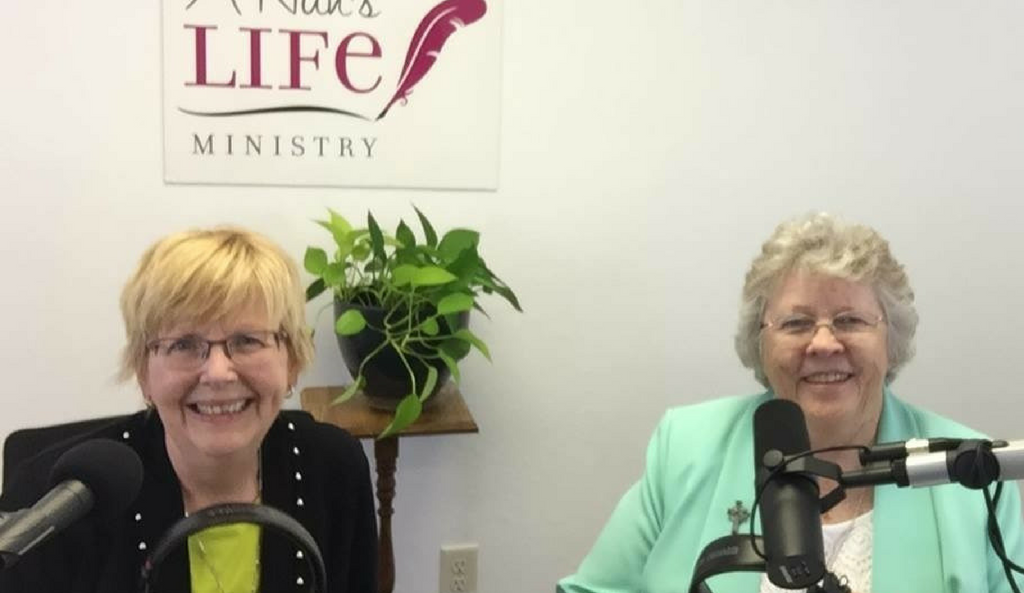
In this Random Nun Clip, a listener wonders how to get her prayer life out of the doldrums. Hear the full Ask Sister podcast at AS199. Hosts: Sister Maxine and guest Sister Shannon Schrein, OSF, a Sylvania Franciscan and a theologian.
SISTER MAXINE: I’m Sister Maxine with today’s guest, Sister Shannon Schrein, an awesome theologian and a Sister of St. Francis from Sylvania, Ohio. We had another question that came in. This one came in from Michelle and she asked this question using the Disqus comment box on our website. A side note: on many of the pages of our website that have content, you can leave comments and ask questions right there on the page. So, Michelle asked, “My prayer life is active and time-consuming, yet I feel like the prayers themselves are less authentic, and I find myself falling back into default prayers. What should I do?”
SISTER SHANNON: The first thing I notice about your question, Michelle, is that you choose faithfully to have an active prayer life. That says something about you and the dedication to your relationship with God. And the fact that you say it is time-consuming suggests to me that you set aside an amount of time every day for your prayer, which is a very wonderful discipline to enter into. It’s a wonderful way to maintain a relationship. When we want to deepen a relationship with our friends, we want to spend time with them. And so, first of all, you’re way ahead of the game in terms of your decision to be a person of prayer and to do so. Now you have some concerns about whether or not your prayer is authentic. Our prayer style evolves over our lifetime as we become more relational in our prayer. The more we come to know who God is, the deeper our prayer life becomes. Think about the time spent with a very dear friend that you love. There are often periods in that kind of a relationship where no words need to be spoken, where you’re just at ease with one another, so sometimes quiet prayer where you’re just in God’s presence and choosing to be there and to be still in the presence of God, that’s good. We can do sometimes without the words.
SISTER MAXINE: I also get a sense that Michelle is very cognizant of the difference between the quality of her prayer and the quantity, and so she says she’s falling into sort of "default" prayers now. She didn’t exactly say what she meant by default, but my sense is that it’s prayers like the Hail Mary or the Our Father or the Memorare, ones that people would recite.
SISTER SHANNON: Yes, the prayers that we’ve learned by rote, that we fall back to, or that we pray often, for example, the prayer of the rosary. Let me tell you a story about Jesus and Jesus’ prayer life, which we know was very rich. If you’d like to explore that, I would encourage you to read the Gospel of Luke and note the number of times in that Gospel that there is a reference to Jesus being at prayer. It happens before every significant event in his life, and in all that he does, he gives thanks. But at the end of Jesus’ life, there are the words he says from the cross in the Gospel of Mark, and it’s repeated in the Gospel of Matthew. When Jesus is dying, he says “Eloi, Eloi, lema sabachthani?” which is Aramaic for the words, “My God, My God, why have you forsaken me?”
Sometimes I think mistakenly people interpret that as Jesus in despair. Let me shed a little light on this. That is the first verse of Psalm 22. If you’d like to look up Psalm 22, I encourage you to do so. The Psalter is rich with prayer and like the prayers that we know in common today, such as the Our Father, if I was in a gathering of people and I began the words, "Our Father who art in heaven…,” whether you said it aloud or you finished it in your heart, your tendency would be to finish that prayer completely because you know it so well. That was true of the Hebrews in the time of Jesus. They knew the Psalter if they were schooled in the Scripture. They knew those psalm prayers like we know the default prayers if you will, and what’s wonderful about the psalms is that they express the feeling of the psalmist and the experience that they’re having but they always resolve themselves with hope and grace. So if you read all of Psalm 22, you would see that ,by the time the psalmist finishes his prayer, he no longer is feeling that sense of despair or hopelessness or that God has abandoned him: he has come around to the realization that God is there with him, and it gives him hope and grace. I want to suggest to you that in those words, Jesus is not expressing despair. Jesus is praying.
SISTER MAXINE: We have in the chat room a comment that relates to what you were saying just a little bit earlier, from Marg who says, "You know, default prayers are better than no prayers."
SISTER SHANNON: There you go.
SISTER MAXINE: They often can pave the way to a different kind of prayer.
SISTER SHANNON: And they take you to a place where you find your center again. I was telling Sister Maxine when we were talking about this earlier, that my default prayer is the Memorare. I love that prayer. I have a devotion to the Blessed Mother, and that phrase, “Remember O most gracious Virgin Mary, that never was it known that anyone who fled to your protection, implored your help, or sought you was left unaided.” When I’m driving in my car and it starts to rain really hard and I get scared, I say the Memorare because it takes me to that place of comfort, that place of security. It has become for me a really deep prayer and I say it with meaning in a way that I probably didn’t when I first memorized it. I say it out of my heart, not just out of the words.
To hear full episodes of A Nun’s Life podcasts, visit the podcast page at anunslife.org/podcast. You can hear the full episode of this podcast at AS199.





